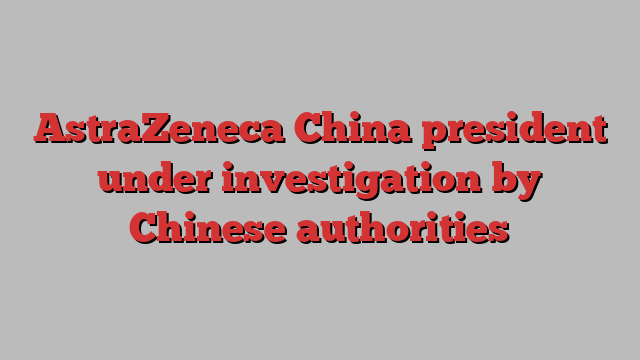
Unlock the Editor’s Digest for free
Roula Khalaf, Editor of the FT, selects her favourite stories in this weekly newsletter.
AstraZeneca’s China boss, one of the country’s most high-profile pharmaceutical executives, is under investigation by Beijing authorities, as a crackdown on the sector intensifies.
The British drugmaker said on Wednesday that its China president Leon Wang was “co-operating with an ongoing investigation”. The statement did not clarify the nature of the probe.
The pharmaceutical chief has been crucial to AstraZeneca’s fortunes in China, where it generated $5.9bn in revenues last year, making it the largest overseas drugmaker by sales in the country. AstraZeneca shares fell 4 per cent in afternoon trading in London on Wednesday.
The company said its China business would continue under the leadership of its current general manager, a post held by Michael Lai, adding: “If requested, AstraZeneca will fully co-operate with the investigation.”
Wednesday’s statement comes after police in Shenzhen detained a handful of AstraZeneca employees last month over possible infringement of data privacy laws and importing unlicensed medications. It is unclear if Wang’s investigation is related to those arrests.
Wang joined AstraZeneca from rival Roche in 2013, quickly rising the ranks to become country president of the drugmaker. Pursuing a localisation strategy, the group gave him autonomy to build out the China business according to the demands of China’s developing healthcare system.
Wang oversaw the construction of thousands of centres within hospitals to deliver the company’s Pulmicort, a drug for asthma and chronic obstructive pulmonary disease that affects more than 100mn Chinese.
He also led a partnership with the state-backed investment bank China International Capital Corporation to create a $1bn fund to invest in local start-ups.
Wednesday’s update comes as an anti-corruption purge continues to send chills through the private sector, from companies in finance to pharmaceuticals, with a slew of executives facing probes for business dealings that involved state-owned entities, in cases that can date back many years.
That crackdown comes as China is actively trying to court investment from foreign companies, after zero-Covid controls, a sluggish economy and geopolitical tensions prompted many to shy away from committing new money to the country.
Beijing has targeted pharmaceutical companies and hospitals over the past year, in a campaign designed to root out kickbacks, the misuse of public funds and other abuses that have increased the costs of medical care. Leading public health officials from Guangdong and Guizhou have also been caught up in the corruption crackdown.
The pharmaceutical sector has been a bright spot in the country’s bid to attract foreign capital, however. Western pharmaceutical companies and investors last year inked a record number of licensing deals with Chinese drugmakers that lack capital to fund late-stage drug development and global expansion.
AstraZeneca’s chief executive Pascal Soriot said earlier this year that China was a “great source of innovation”. In December, the company made one of its first acquisitions in the country, paying up to $1.2bn for cell therapy company Gracell Biotechnologies and adding to the wave of foreign pharmaceutical companies buying assets.
Additional reporting by Ian Johnston and Wang Xueqiao